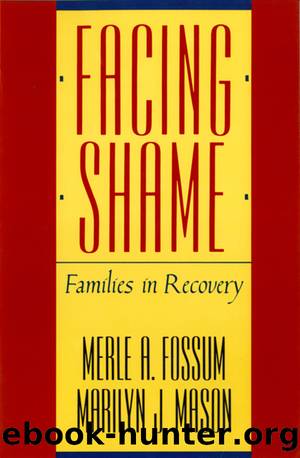Facing Shame by Merle A. Fossum

Author:Merle A. Fossum
Language: eng
Format: epub
Publisher: W. W. Norton & Company
3) BLAME
If something doesnât happen as you planned, blame someone (yourself or someone else). Blaming is pervasive in the shame-bound family and in all relationships which have a strong shame component. The blame may be overt, as in the message, âIf it werenât for you I would be happy.â Often the blame is masked as something else. A woman thinks she is only expressing her feelings, but what she says is, âI feel that you always get upset when Iâm doing my work and that stops me from accomplishing anything.â In fact, she has expressed nothing at all about her own feelings. A personal question which asks âWhy?â is usually an emotional trap for someone to blame themselves or justify why they are not blameworthy. âWhy do you . . . ?â or âwhy donât you . . . ?â often pose as innocent questions but are loaded with bad feelings. Self-blame is a direct expression of the rule and can be highly controlling in relationships, in that it effectively grabs the initiative. While self-blame is painful, it keeps the blamer in charge of the interaction and thus reduces surprise.
In effect, a personâs blaming behavior covers oneâs shame or projects it onto another person. When I focus on what you do to me, I feel a reduction in my own anxiety about myself. If, for example, I tell you that you never approach me warmly, I donât have to experience the vulnerable feeling of telling you how lonely or needy I feel. If Iâm a shame-bound person, I cannot feel vulnerable or needy without being ashamed of it. So blaming becomes an automatic evasion of my deeper feelings.
In fact, any unexpected or unplanned occurrence can become a moment for blame, whether or not it is inherently negative. A flat tire while driving to work is understandably negative and in this system produces blame of oneself or someone else. But the delivery of a package by a parcel service three days before someoneâs birthday, instead of on the birthday, isnât inherently negative. Within this system it is liable to being perceived as ruining the senderâs whole plan and someone is likely to be blamed.
The blame rule is activated to maintain the equilibrium of the system in those situations where the control rule breaks down. When security is sought through control as it is in this family system, even to the point of a compelling demand, the reality of lifeâs unpredictability and uncontrollability invokes pervasive anxiety. Blame is the bitter salve habitually used by members of the system to regain the illusion of control. Whether the usual pattern is self-blame or blame of others, blaming always provides a reliable fall-back position of control and predictability when the first attempt to be in control or do things perfectly doesnât succeed. In this way, we see the interaction of the first three rules of control, perfection, and blame.
The first three rules are seen at work in the following example from a therapy session. The
Download
This site does not store any files on its server. We only index and link to content provided by other sites. Please contact the content providers to delete copyright contents if any and email us, we'll remove relevant links or contents immediately.
Collaborating with Parents for Early School Success : The Achieving-Behaving-Caring Program by Stephanie H. McConaughy; Pam Kay; Julie A. Welkowitz; Kim Hewitt; Martha D. Fitzgerald(896)
Entrepreneurship Education and Training: The Issue of Effectiveness by Colette Henry Frances Hill Claire Leitch(664)
Adding Value to Policy Analysis and Advice by Claudia Scott; Karen Baehler(498)
Materializing the Middle Passage by Jane Webster;(496)
Race and American Political Development by unknow(483)
Sociological Perspectives of Health and Illness by Constantinos N. Phellas(476)
American Government and Politics Today by Steffen W. Schmidt Mack C. Shelley Barbara A. Bardes(475)
Human and Global Security : An Exploration of Terms by Peter Stoett(459)
Control Of Oil - Hardback by Kayal(455)
The Disappearance of Rituals: A Topology of the Present by Byung-Chul Han(397)
Advances in Child Development and Behavior, Volume 37 by Patricia J. Bauer(395)
The Catholic Church and European State Formation, AD 1000-1500 by Jørgen Møller(388)
The World According to China by Elizabeth C. Economy(378)
Theories of Counseling and Psychotherapy: A Case Approach by Nancy L. Murdock(370)
Left Is Not Woke by Susan Neiman(365)
Application of classical statistics, logratio transformation and multifractal approaches to delineate geochemical anomalies in the Zarshuran gold district, NW Iran by unknow(362)
Turkey's Relations with the West and the Turkic Republics: The Rise and Fall of the Turkish Model by Idris Bal(352)
Cross-Cultural Child Development for Social Workers by Lena Robinson(347)
Japan's Ainu Minority in Tokyo by Mark K. Watson(330)
